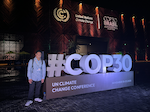

“I remember after my first Arabic class at Gettysburg, I called my mom and dad and said, ‘this is what I want to do for the rest of my life—speak this language.’ ”
You could say the linguistic passion was instantaneous for Spencer King ’19. King is already fluent in English and Swahili. That makes Arabic his third language—and possibly the toughest to learn.
“The thing about Arabic is that it takes three times longer for an English speaker to learn than any other language,” King explained.
King’s appreciation of international culture and language stems from his upbringing. He was raised in Kijabe, Kenya, where he lived since he was eleven months old. In his college search, he was looking for a school in the United States where he would be able to thrive in small classes and establish strong relationships with professors and peers—so he chose Gettysburg. With varied coursework focused in Economics, International Affairs, and Islamic Studies, as well as practical opportunities to apply what he's learned through the Eisenhower Institute's Inside the Middle East program, King has quickly become an inquisitive and inspired Gettysburgian.
International Background
“I grew up in Kenya speaking Swahili and English,” King said. “When I came to the US, I realized that I couldn’t speak Swahili anymore. I found that I’m not interested in German, French, or Spanish, but I value language because of communication—and I thought that Arabic looked fun.”
After his two subsequent semesters of Arabic at Gettysburg, King was hooked on the language and applied for the U.S. Department of State Critical Language Scholarship (CLS).
“I applied for the CLS after only taking one year of Arabic, but they accepted me into the program,“ he said.
King was thrilled to have the opportunity to travel to Ibri, Oman, for an 8-week, full-immersion into Arab culture for the summer of 2016.

Traveling to the Arab World
Despite being a quick and eager learner, King explained that the initial communication barrier was hard to overcome.
“The first two weeks were tough. I sat in class and felt so lost because I didn't know the language as well as most of the other people in the program who had taken four or five years of Arabic.
“After about two weeks, I started getting in the mode and I could understand the dialect; everything got easier.”
Once King gained confidence though practicing his Arabic, he was better able to participate in the Arab culture in Oman while making important cross-cultural comparisons.
“The culture of Oman was especially interesting for me because I found it to be very similar to the culture in which I grew up, in Kenya,” King explained. “It makes sense because historically Oman actually ruled a portion of the Kenyan coast; during that time we actually adopted a lot of their culture, including a good portion of their language.”
Despite the linguistic similarities, King was unfamiliar with the dry heat and religious practices of the Arab culture.

“I was living on the edge of the largest sand desert in the world,” King said. “It would regularly hit 122 degrees! For cultural appropriateness, I had to cover my whole body most of the time,” he said. “I wore a dishdasha, an Arab garment similar to a robe, as so that I stayed covered and modest.”
With the religious focus, King experienced a strong sense of cultural affiliation in Ibri. Even as a non-fluent speaker of Arabic from a western society, King was treated as a member of the community.
“It was cool because as long as you somehow knew someone who was invited to a party or an event, you were invited,” King revealed. “I actually went to three weddings during my time in Ibri, and people who I didn't even know invited me to stay in their homes.”
Considering the Future
Even though he is only a sophomore, King has some ideas about how he will take his cultural and linguistic passions into his post-grad life.
“In the future, I would like to work in the Arab world or for the US Foreign Service,” he said. “I think it'd be fun to live like a nomad and travel around for the rest of my life, using my language skills and experiencing new things.”
For another story about the Critical Language Scholarship, Leah Pinckney ’19 shares about her abroad experience in Taiwan.


